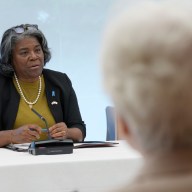When we listen to or play music, we relax and express ourselves honestly. Music helps us practise language and hand-eye coordination and it builds confidence.
Such is the focus of music therapy, which Rachael Finnerty, 35, has been practising for the last decade.
Growing up, she played piano in her spare time, and completed grade nine with the Royal Conservatory of Music. But she was also fascinated by human interactions.
She thought eventually she’d become a speech therapist when she left her home to study psychology at Dalhousie University in Halifax. She was in second year when she came across a book in the library about music therapy. “I was just in seventh heaven,” she recalls after realizing she could combine her passions.
Since there were no graduate programs in music therapy in Canada at the time (there is one now, at Sir Wilfrid Laurier in Waterloo, Ont.), Finnerty stayed in Europe after studying in France for her final year of university, volunteering at music therapy clinics.
She applied and was accepted to the masters program at Cambridge University. After finishing the 12-month program — which included theory and plenty of hands-on work — she returned to Canada in 2001. She set up a private practice and began working with autistic kids, people with brain injuries and older adults with dementia. She then also worked part time at Sunnybrook Health Science Centre, working with seniors.
In 2007, Finnerty and her growing family moved to nearby Hamilton, a city that fortunately for her had few music therapists. Finnerty found numerous clients right away and in early 2010 opened up her own studio offering music, creative writing and art therapy, and other services such as speech language pathology and Reiki.
Finnerty sees few clients herself, but devotes most of her time to running her clinic, teaching at McMaster University and Laurier, and teaching music classes for kids with special needs.
When Finnerty does a session, she often begins by singing a simple song while playing guitar. For clients who struggle with speech, she encourages them to sing a line. She’ll then have her client strum a string on the guitar, play the piano or pick up a simple instrument . Over time, she may encourage a client to compose music on the spot, or rewrite words to a familiar song to express feelings.
For the client, it’s all fun, but Finnerty is always thinking about building their confidence, working on hand-eye-coordination or assessing someone’s condition. “If we make great music, that’s lovely, but that’s not why we’re in session.”
Diane Peters once hawked magic pens at the Canadian National Exhibition. She’s now a writer and part-time journalism instructor.
















